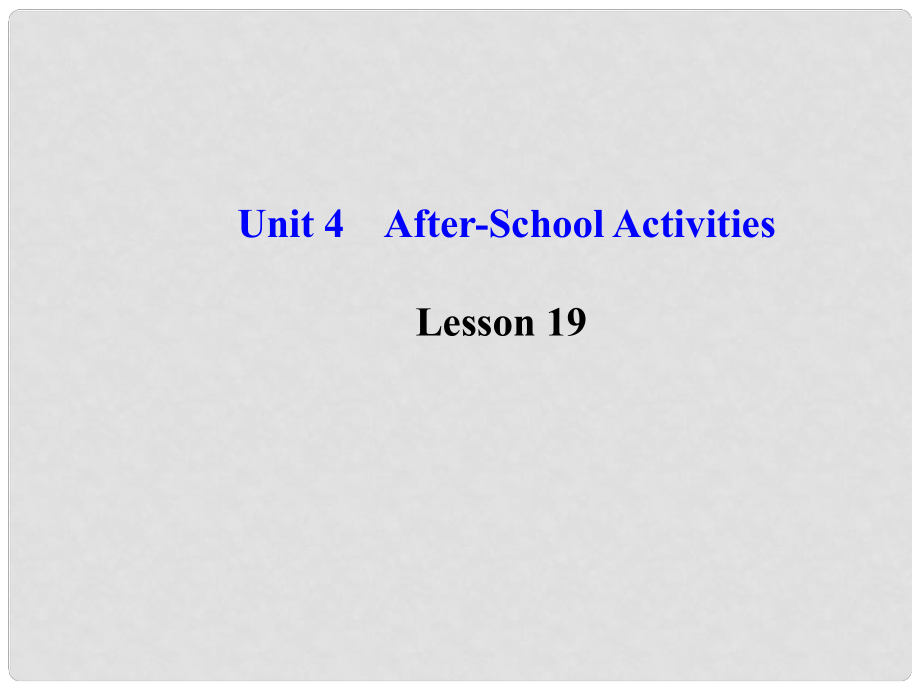《七年級(jí)英語下冊(cè) Unit 4 AfterSchool ActivitiesLesson 19課件 (新版)冀教版》由會(huì)員分享����,可在線閱讀,更多相關(guān)《七年級(jí)英語下冊(cè) Unit 4 AfterSchool ActivitiesLesson 19課件 (新版)冀教版(18頁珍藏版)》請(qǐng)?jiān)谘b配圖網(wǎng)上搜索���。
1�����、 Unit 4 After-School ActivitiesLesson 19句型展示句型展示1. 明天你想過來吃晚飯嗎�����?明天你想過來吃晚飯嗎���?_ you _ _ _ _ for dinner tomorrow? 2. 放學(xué)后我要去象棋俱樂部���。放學(xué)后我要去象棋俱樂部����。I _ _ _ the chess club _ _ . 答案:答案:1. Would; like to come over 2. am going to; after school3. 今年我數(shù)學(xué)沒學(xué)好���。今年我數(shù)學(xué)沒學(xué)好�����。Im _ _ _ _ math this year. 答案:答案:not doing well in1.
2��、Would you like to come over for dinner tomorrow? 明天你想過來吃晚飯嗎�����?明天你想過來吃晚飯嗎����?【自主領(lǐng)悟【自主領(lǐng)悟】(1)would like意為意為“想,想要想�����,想要”����,與,與want意義相意義相同��,但語氣更委婉��。同,但語氣更委婉����。would like可與任何人稱連用,沒有人稱可與任何人稱連用�����,沒有人稱和數(shù)的變化�����,肯定句中和數(shù)的變化����,肯定句中would常在主語后面縮寫為常在主語后面縮寫為d。 (2)would like to do sth. =want to do sth. 意為意為“想要做某事想要做某事”��。例如:例如:I would like
3�����、 to buy some books. =I want to buy some books. 我想買些書��。我想買些書�����?����!練w納拓展【歸納拓展】would like的用法的用法(1)would like sth. =want sth. 想要某物想要某物例如:例如:Would you like some milk��?你想喝些牛奶嗎���?你想喝些牛奶嗎�����?(2)would like sb. to do sth. 想要某人做某事想要某人做某事(3)Would you like sth. 的肯定答語常用的肯定答語常用Yes, please. /OK. /All right. 等等; 其否定答語常用其否定答語常用N
4����、o, thanks. Would you like to do. . . 的肯定答語常用的肯定答語常用Yes/Sure, Id like/love to. ���; 其否定答語常用其否定答語常用Sorry, I cant. /Id like/love to, but. . . ���。【活學(xué)活用【活學(xué)活用】 我想要一些蘋果�����。我想要一些蘋果。I _ _ some apples. =I _ some apples. Shed like _ (eat) some bananas. 答案:答案:would like; want to eat2. We are both busy all week. 整個(gè)星期我們兩
5��、個(gè)都忙��。整個(gè)星期我們兩個(gè)都忙���?���!咀灾黝I(lǐng)悟【自主領(lǐng)悟】both意為意為“二者二者(的的)”��,置于���,置于be動(dòng)詞�����、助動(dòng)詞����、動(dòng)詞��、助動(dòng)詞��、情態(tài)動(dòng)詞之后��,行為動(dòng)詞之前�����。例如:情態(tài)動(dòng)詞之后����,行為動(dòng)詞之前。例如:We both like English. 我們都喜歡英語��。我們都喜歡英語���?��!居梅ū嫖觥居梅ū嫖觥縝oth和和all的區(qū)別的區(qū)別both表示表示“兩者都兩者都”,如果表示如果表示“(兩者兩者)都不都不”,用用neither。例如��。例如:Wang Lin and Li Ming both stand up.王林和李明都站了起來�����。王林和李明都站了起來。all指指“三者或三者以上都三者或三者以上都”,如
6����、果表示如果表示“(三者或三者三者或三者以上以上)都不都不”,用用none。例如�����。例如:All my students like learning English.我所有的學(xué)生都喜歡學(xué)英語���。我所有的學(xué)生都喜歡學(xué)英語���。【活學(xué)活用【活學(xué)活用】 Which of the two books is more interesting? Sorry, I havent read them. You can buy _ of them if you like. A. all B. any C. some D. bothHow about coming over for dinner this evening?
7����、 今晚過來吃晚飯?jiān)趺礃樱拷裢磉^來吃晚飯?jiān)趺礃?���?【自主領(lǐng)悟【自主領(lǐng)悟】How about. . . ? 意為意為“怎么樣怎么樣(好不好好不好)?”常用來征求對(duì)方的意見或詢問有關(guān)情況����,相當(dāng)于常用來征求對(duì)方的意見或詢問有關(guān)情況�����,相當(dāng)于What about. . . ? about為介詞,其后接名詞����、代詞或動(dòng)名詞。為介詞�����,其后接名詞��、代詞或動(dòng)名詞��?����!净顚W(xué)活用【活學(xué)活用】 What about _ (walk) in the park after supper? 答案:答案:walking. 從方框中選詞并用其適當(dāng)形式填空從方框中選詞并用其適當(dāng)形式填空go, like, story, come over
8���、, do1. Both of us _ to watch football games. 2. What about _ shopping with me this Saturday? Good idea. 3. Jenny _ well in social studies this term. 答案:答案:1. like 2. going 3. does4. Would you like _ for lunch this weekend? OK. Id love to. 5. The teacher often tells us lots of interesting _ in her cl
9����、ass. 答案:答案:4. to come over 5. stories. 單項(xiàng)填空單項(xiàng)填空1. The boy is interested _ ping-pong and he also does well _ basketball. A. in; at B. in; in C. at; at D. at; in2. We have no classes tomorrow. How about _ ? A. go to fish B. go fishingC. going to fish D. going fishing3. My parents are _ English teacher
10、s. A. all B. other C. both D. the other4. _ are you going to do this evening? Nothing. A. How B. What C. Where D. Why5. Would you like to go swimming with me? _ A. No, I dont want to. B. Yes, Id love to. C. Very much. D. Yes, please. 句型轉(zhuǎn)換句型轉(zhuǎn)換1. Id like to join the chess club. (改為一般疑問句改為一般疑問句) _ you
11�����、_ _ join the chess club? 2. We are going to have a party next week. (對(duì)畫線部分提問對(duì)畫線部分提問) _ _ you _ _ _ next week��?3. My sister is good at math. (改為同義句改為同義句)My sister _ _ _ math. 答案:答案:1. Would; like to 2. What are; going to do3. does well in4. good; vegetables; are; our; health; for(連詞成句連詞成句)_5. Tom plays volleyball every Sunday. (用用tomorrow改寫句子改寫句子) Tom _ _ _ _ volleyball tomorrow. 答案:答案:4. Vegetables are good for our health. 5. is going to play
 七年級(jí)英語下冊(cè) Unit 4 AfterSchool ActivitiesLesson 19課件 (新版)冀教版
七年級(jí)英語下冊(cè) Unit 4 AfterSchool ActivitiesLesson 19課件 (新版)冀教版

